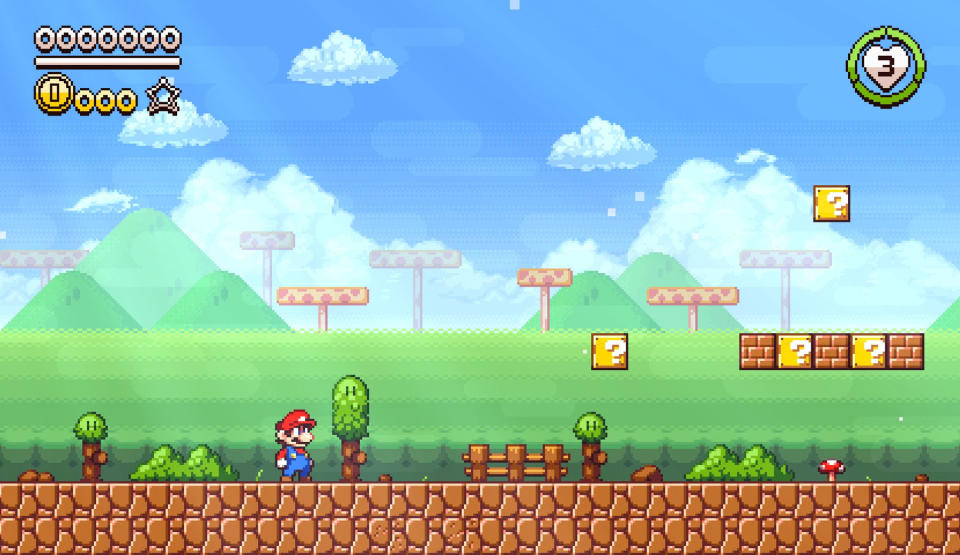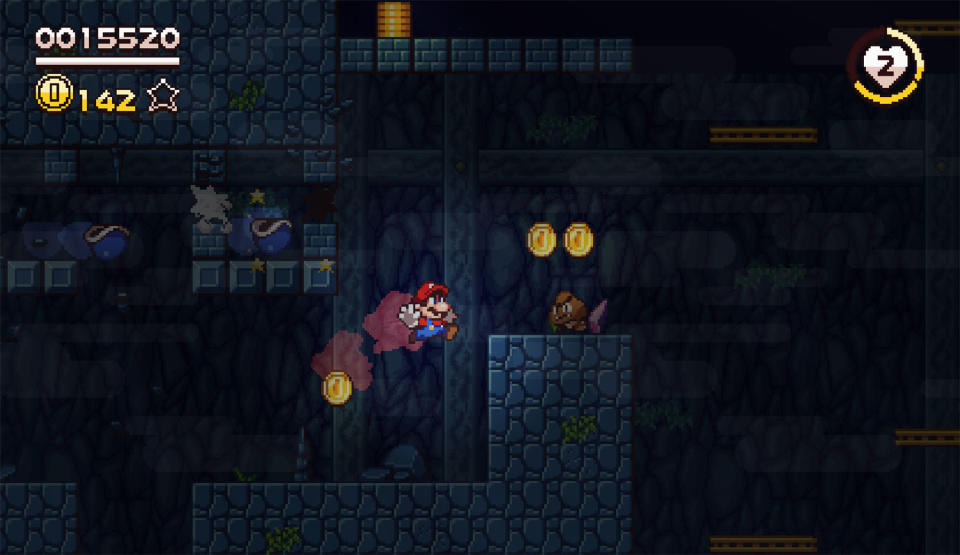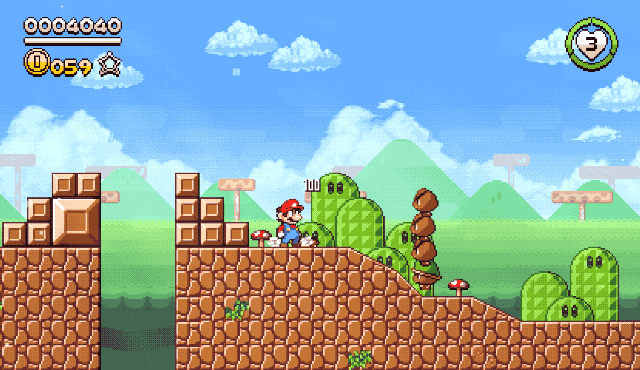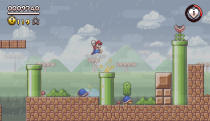‘Super Mario Flashback’ is a stunning pixel art fan game
It’s like if Nintendo gave Mario the ‘Sonic Mania’ treatment.
If you fancy playing some classic Mario, there are plenty of ways to go about it. You can buy a tiny NES or SNES Classic, for instance, or subscribe to Nintendo's Switch Online service. There's also Super Mario Maker, legally grey emulation and, of course, the original cartridges if you own a NES, SNES or modern console equivalent like the Analogue Super NT. In the not-too-distant future, though, there might be another way to get your fix of Nintendo nostalgia: a beautiful fan game called Super Mario Flashback.
The 2D platformer will reinterpret levels from many different Mario games. These include the original Super Mario Bros. and three-dimensional adventures such as Super Mario 64. Some platform and enemy layouts will be familiar to people who have played the original games. Others will be subtly tweaked or completely revamped to surprise players or provide a different challenge.
The big draw, though, is the visuals. Super Mario Flashback has some truly gorgeous pixel art that is both distinctive and faithful to the portly plumber's original adventures. The latest demo, presented at the Sonic Amateur Games Expo (SAGE) in August, is a brilliant blend of green pipes, Goombas and bouncing Koopa Paratroopers. Every asset, including Mario, has a fresh but recognizable look that truly pops on screen. The overhaul won't be for everyone (my colleague Mat Smith isn't a fan) but you can't dispute the detail and consistency across each level.
Flashback doesn't just look different -- it plays differently, too. Mario has a three-segment health bar, similar to the pinwheel in Super Mario 64, rather than the usual mushroom system that grants a one-hit shield. Mario can also jump and slide down walls, granting safe access to higher-placed platforms, stars and question-mark boxes. These moves are possible in modern Mario games, such as New Super Mario Bros., but not the original NES titles.
Flashback has two obvious parallels: Sonic Generations and Sonic Mania. The first was an ultra-glossy platformer that revisited almost every game in Sonic history. The second, more successful title celebrated Sonic's roots with remixed zones and pixel art inspired by the Genesis classics. Flashback feels like a blend of the two, with its updated sprites and assorted levels inspired by Mario titles new and old. The big difference, of course, is that Generations and Mania were official Sega titles; Flashback is being made by a bunch of indie developers for fun.
The fan game was conceived by a 20-year-old student known as Mors online. He grew up in Turkey and discovered Mario at the age of six through a knock-off NES console called a Famiclone. It came with an impressive '10,000 games in one' cartridge that included the original Super Mario Bros. "That was probably the first 'real' game I played," he told me over Discord. The year was 2004, though, and the PlayStation 2 was the king of consoles. Mors played Sony's legendary system at a friend's house and soon persuaded his parents to buy one, too. Unsurprisingly, the youngster "kind of forgot about Mario" for the next few years.

Mors rediscovered Mario through a legally dubious Nintendo 64 emulator. He also played Mario Forever, a popular fan game based on the original Super Mario Bros., with one of his classmates in the fourth grade. Mors had always been interested in computers and, aged nine, received a copy of GameMaker from a family friend. "I was the kid in middle school who would fix the teacher's computer whenever they messed something up," he explained. At first, Mors used GameMaker to build simplistic maze puzzles and platformers. But he soon graduated to Mario clones that used assets ripped from Google Images and Mario Forever.
"The very first ones were extremely bad," he said.
"At the time, I only knew what 'download' meant."
At first, Mors made games for himself and his friends. But he later discovered a site where people could share and download GameMaker creations. There was a forum, but Mors didn't know enough English to participate or learn from his more-experienced peers. "At the time I only knew what 'download' meant," he said. Still, the young developer persevered and eventually uploaded his own project called Super Mario Ztar to a Mario fan-game site called MFGG. It was a modest platformer with a special 'super flower' power-up that allowed Mario to shoot infinite fireballs until he took damage.
"The reaction was pretty negative," he recalled. "I was 12." Thankfully, his English was still so poor that he couldn't understand most of the feedback.
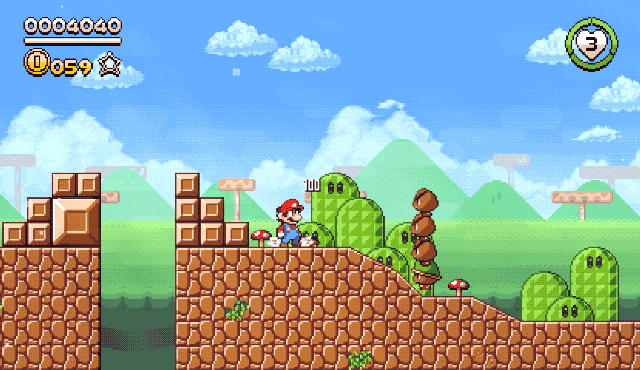
Undeterred, Mors started conceptualizing a new Mario fan game called Mario and Luigi's Coin Chaos. The art style would be broadly similar to Super Mario Bros. 3 and Super Mario World; however, the story and levels would take place in an apocalyptic doomsday scenario. "Except when I was working on it, I got bored of the idea and decided to turn it into a more generic fan game," he said. Mors worked on the title for a few years while submitting the occasional mini-game, including Deadly Dart, Yoshi Dash! and Mario Teaches Japanese, for some of MFGG's fan competitions.

The Turkish programmer got bored of Coin Chaos and eventually started a parallel project in 2013. At first, he considered a game like Sonic Generations that would reinterpret levels from different Mario games. He also debated a single-level, exploration-heavy 'Metroidvania' title inspired by the Metroid and Castlevania franchises. "It would have been a really cool concept, but I wasn't sure if I would be able to pull it off," he explained. By 2014, he had canceled Coin Chaos completely and focused his efforts on the Sonic Generations idea. That game, unsurprisingly, would eventually become Flashback.
"I'm not very good at drawing. It's something I find really hard to wrap my head around."
At this point, Nintendo was working on its hugely imaginative Super Mario Maker for Wii U. Mors, however, still only had a PS2 and some Nintendo emulators that could run Mario 64 and the Gamecube-era Super Mario Sunshine. He had never played anything from the Wii and Wii U eras, such as Super Mario Galaxy, Super Mario Galaxy 2 and Super Mario 3D World. Still, he planned to include levels from those games in Flashback.
Mors sees himself as a programmer first and a designer second. He also struggles with some of the artistic aspects of video-game development, such as sprite work and music. "I'm not very good at drawing," he said. "It's something I find really hard to wrap my head around. But since my dream was always to be a mostly self-sufficient indie game developer, I've kind of had to force myself to learn all that stuff."

At first, the game was built using premade assets that are publicly available on MFGG. Mors soon realized that he needed collaborators and recruited some pixel artists including Neweegee and Cruise Elroy. Can of Nothing produced some of the early music and Darkonius joined to help with the level design. "Before I realized it, we had a pretty decently sized team," Mors said. The art style was rough and inconsistent, however. "I'm not saying it was bad, but it was pretty bland," Darkonius said. "It didn't have that level of polish that made you go 'Oh yeah, this is Mario Flashback.'"
According to Mors, the codebase was spiraling out of control, too. "It was becoming very difficult to work with," he said. Development started to slow and, eventually, Mors decided to start over. "I scrapped everything I had previously except for the concepts," the developer explained. It was a huge setback for the project, but the team understood and rallied behind the new version. "We weren't really that sad," Darkonius said, "because we really didn't put that much effort into the visuals. So when Mors said 'Okay fellas, we need to do this from scratch', I was like 'Okay, that's fine.' Then we got to do the new art style."
Mors sticks by the decision. The current iteration of Flashback has some beautiful pixel art and a cleaner, more manageable code base. "If I hadn't done that, I probably would have canceled the game eventually," he said.
Will Nintendo file a DMCA takedown against Flashback?
Nintendo is known for its aggressive stance toward fan-made games and YouTube streamers. In 2016, the company sent DMCA (Digital Millennium Copyright Act) takedown notices to over 500 fan games including the Metroid II remake AM2R. The Japanese game developer has also scuppered massively multiplayer Pokémon clones, smartphone-focused Game Boy Advance emulators and an online archive of Nintendo Power magazines.

The Flashback team doesn't seem too concerned, though. According to Mors, there are two types of projects that attract Nintendo's legal team: remakes, like AM2R and Super Mario 64 HD, and games that are sold for a fee or heavily linked to a creator's Patreon. Mors thinks the latter is why Nintendo targeted so many projects on Game Jolt, a distribution site that allows indie developers to monetize their games. Flashback, meanwhile, is a remix rather than a remake, and won't be charged for. "At first I was worried," he said. "but to be honest, I'm not anymore."
Cruise Elroy added: "We're striving to make the graphical style as unique as we can. And we're not really borrowing that much from the [original] levels." Darkonius, like Mors and Cruise Elroy, is a student. He sees the project as an opportunity to learn and finesse his skills as a developer. Nintendo could file a cease-and-desist tomorrow, but it can't take away the knowledge he's gained along the way. "We're not putting money into it," he explained. "We're not losing time doing it. There's nothing to lose, technically."
Mors hopes the game will be ready by early 2020. The team was planning to release a new demo on November 4th, but that's now slipped to April next year. "We are working on something," he revealed in the official Discord server for Super Mario Flashback. "I'm pretty sure it's something you guys will like. It kind of came out of nowhere, and, for now, I want to focus on that. [But] I can assure you guys that Flashback is not getting affected by this in the long run." None of Flashback's developers will divulge anything more about this mysterious new project.
Flashback's development has been agonizingly slow. But unlike with Mario and Luigi's Coin Chaos, Mors isn't giving up. The Turkish developer enjoys the project but also feels a sense of obligation to complete it. "I've been working on this game for such a long time now," he explained, and it's become pretty popular-ish. I feel like it would be dumb to stop now."



